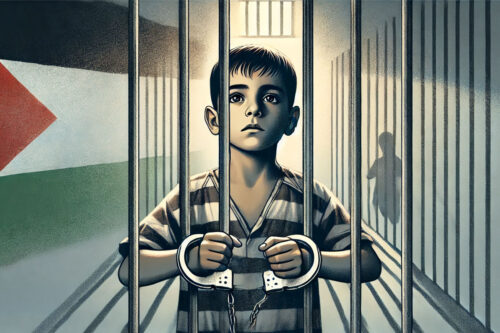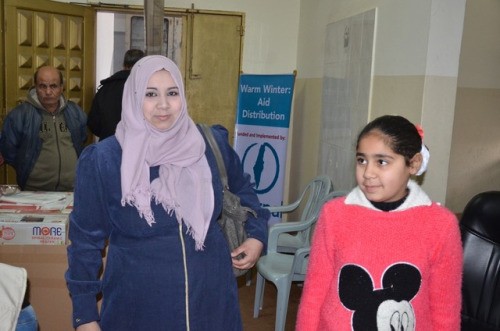5 observations from Interpal’s ‘Miles of Smiles’ delegation to Gaza

On 5 June, the 51st anniversary of the Naksa, Interpal’s ‘Miles of Smiles’ delegation, which included the Chair of the Board of Trustees, Ibrahim Hewitt, visited the occupied Gaza Strip.
We take a look at the five most significant observations that our chairman made during his visit.
-
Gaza’s hospitals are in disarray, and lives are in danger
On the second day of their visit, the delegation met with the Deputy Minister of Health at Al Shifa Hospital, the largest hospital in Gaza, widely known for being one of the many hospitals and health clinics targeted during the 2014 Israeli assault. The hospital suffers from a shortage of staff with many not receiving salaries, as well as a severe shortage of medical supplies.
The recent influx of casualties from the Great March of Return has stretched staff, and the hospital is struggling to fully treat the thousands of protestors who have been injured.
Our chairman relayed to us just how bad the situation has become since the protests began:
“On 14 May, described by officials as ‘the most difficult day for the Ministry of Health since 2014’, protesters faced live ammunition, ‘toxic gas’ and explosive bullets. We saw the effects of such bullets on the human body. Dr Medhat Abbas, the director of the hospital, explained that they had never seen such symptoms affecting victims of “ordinary” tear gas. Seven thousand people were injured in one day. Many had to be treated on the floor in corridors because there was no space in the emergency rooms.”
Bandages, antibiotics and intravenous fluids are in short supply at Al Shifa Hospital and 50% of essential drugs are at zero-stock level. This is the case for the majority of hospitals and health clinics across the occupied Gaza Strip. The health sector in Gaza is on the brink of collapse and people urgently need support. Find out how you can help here.
2. Razan Al-Najjar’s mother is working to ensure her daughter’s legacy lives on
Razan Al-Najjar was a volunteer medic who was shot and killed by an Israeli sniper on 1 June as she helped injured protesters along the Gaza border. The Interpal delegation learned that just a few days before she was killed, Razan posted a video on social media with an emotional appeal direct to Interpal. Watch it here:
https://www.youtube.com/watch?v=GiJmaNXd6fY
Our chairman spoke at length with Razan Al-Najjar’s mother, and discussed her wishes to continue Razan’s legacy. Watch their meeting here:
https://www.youtube.com/watch?v=p92NCSVuTeY
3. The Bedouin community is one of the most marginalised groups in the Gaza Strip
Palestinian Bedouin communities experience the worst levels of poverty in the occupied Palestinian territories. Their lived experiences, however, can often go overlooked, making them one of the most vulnerable and marginalised groups in Palestinian society. According to Ibrahim Hewitt;
“It is astonishing that people in Gaza can be living in worse conditions than those found in the refugee camps, but that is what we saw in the Bedouin encampments. They really are the forgotten Palestinians.”
The delegation visited the Almasalah Bedouin village between Rafah and Khan Younis to deliver urgent supplies. Check out the pictures!
4. The Vision Project has helped to change lives for the better

The delegation visited the UNRWA Rehabilitation Centre, home to the Interpal-funded Vision Project. The project provided over two hundred blind and visually impaired children in Gaza with cutting-edge digital technology to help them access information sources, learning opportunities and creative initiatives.
“One of the great things about field visits is that we are able to see for ourselves what Interpal funding has been able to do, and then reassure our generous donors that their support makes a huge difference to the lives of Palestinians in desperate need. Digital technology may well be a luxury for many people, but for the children helped by the Vision Project, it is an essential aid to their education and future.”
Ibrahim Hewitt
Find out more about the Vision Project here.
5. Journalists’ lives are at risk

Motasem Dalloul and Ibrahim Hewitt
During the trip, the delegation visited the family of Yasser Al-Murtaja, a photojournalist who covered many of the previous ‘Miles of Smiles’ convoys. Yasser was shot and killed by the Israelis while covering the Great March of Return protests. They also visited Motasem Dalloul (Abu Jumua) who was shot and seriously wounded by an Israeli sniper while covering the same protests.
Two journalists have been killed and 175 injured while covering the Great March of Return protests that began in March 2018. The majority of journalists were wearing clearly marked clothing, suggesting that they may have been targeted by Israeli snipers in violation of international humanitarian law.
“Israel doesn’t want journalists to reveal the extent of its brutality,” Dalloul told Ibrahim Hewitt, his colleague at Middle East Monitor.
The Interpal delegation with ‘Miles of Smiles’ visited the Gaza Strip between 2 and 13 June 2018. Despite the strength and resilience of the Palestinians, living in Gaza is difficult and disheartening. The blockade, the violence and the lack of opportunity is a potent combination leading to despair and suffering. Gaza’s people deserve better. They deserve clean water, safe homes, quality medical care and freedom of movement. They deserve a functioning society, not dying under occupation and siege.
“I am heartened to witness the courageous work that Interpal’s field office staff carry out every single day, and I thank all our donors in the UK for making this possible,” added Ibrahim Hewitt.
To find out how you can help the people of Gaza, please visit interpal.org or call us on 020 8961 9993.
Calculate your Zakat
Confused about how to calculate your Zakat? Try our simple-to-use calculator










![A Shadow R1 spy aircraft operated by the UK's Royal Air Force, accused of supporting the genocide in Gaza [Jerry Gunner / Wikimedia]](http://www.interpal.org/wp-content/uploads/2025/04/1768px-Shadow_R1_5AC_Sqdn_RAF_Waddington_this_morning-e1745166357309-500x333.jpg)

![Fighters from Israel's pre-state militia occupying the village of Deir Yassin, April 1948 [IDF archive / Wikimedia]](http://www.interpal.org/wp-content/uploads/2025/04/Jewish_militias_in_the_village_of_Deir_Yassin_April_1948_cropped_and_edited-e1745166391491-500x333.jpg)

